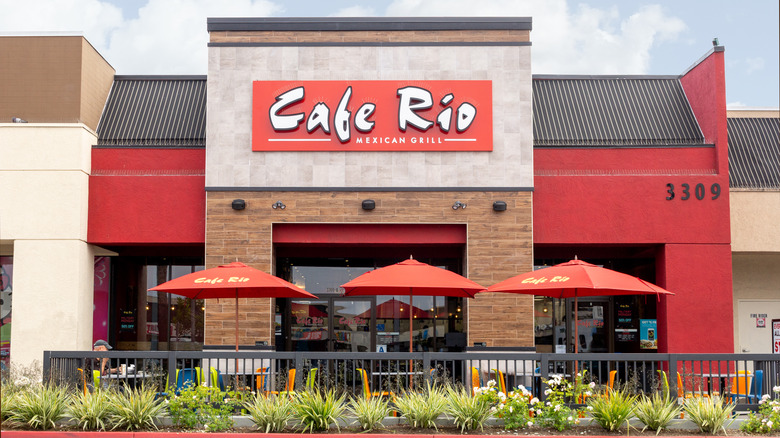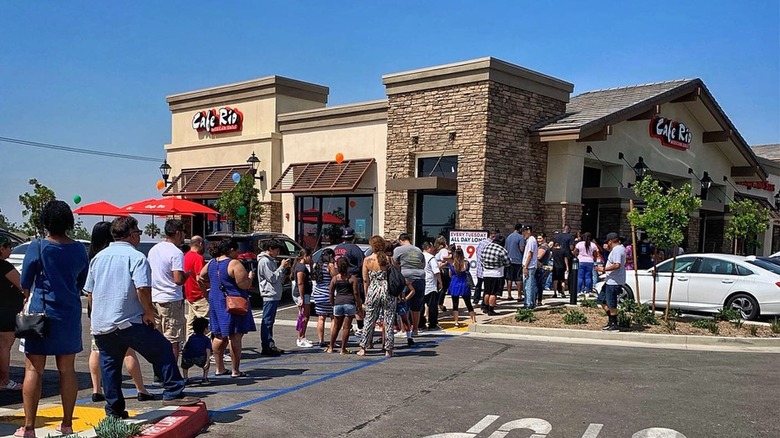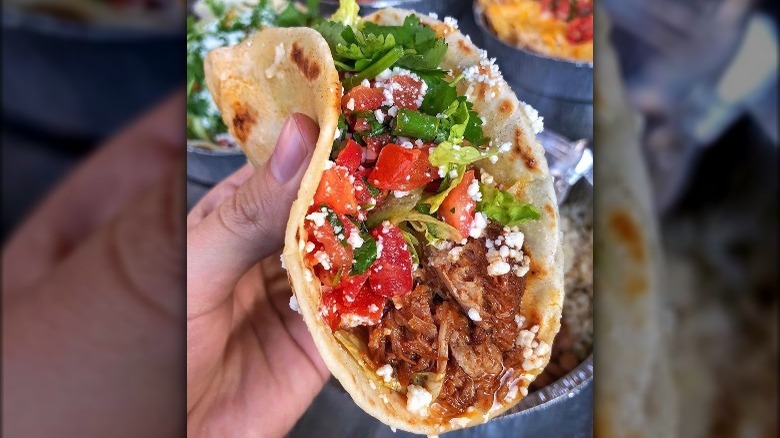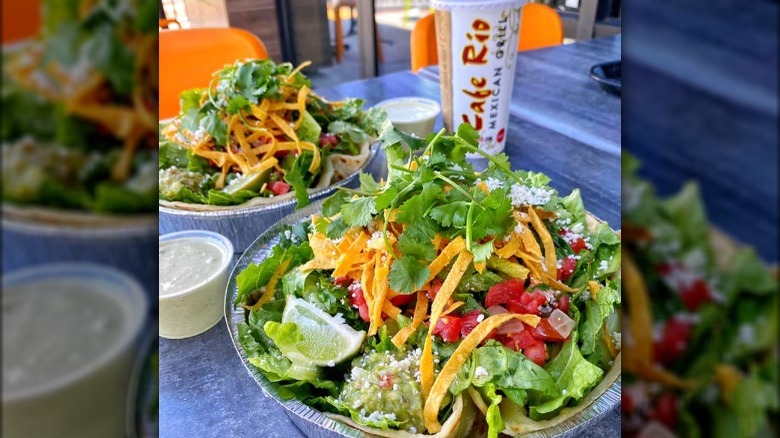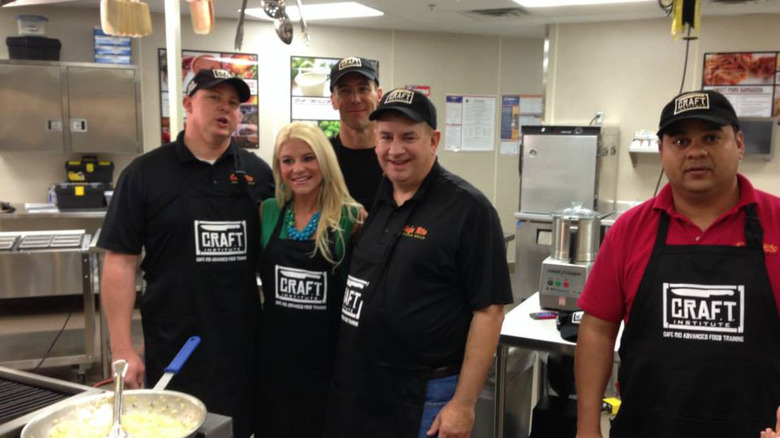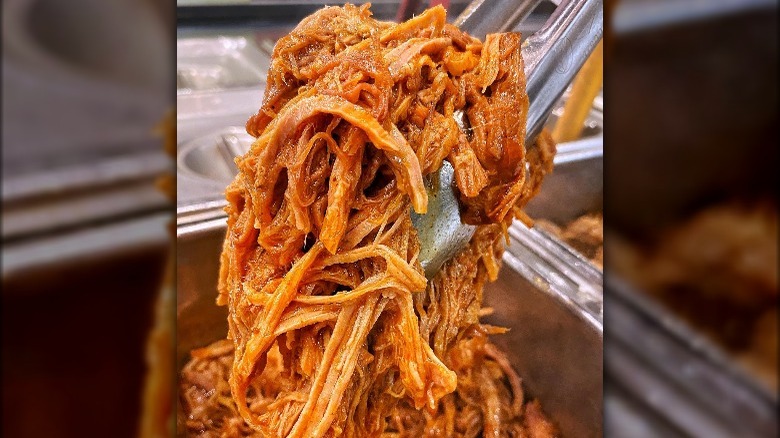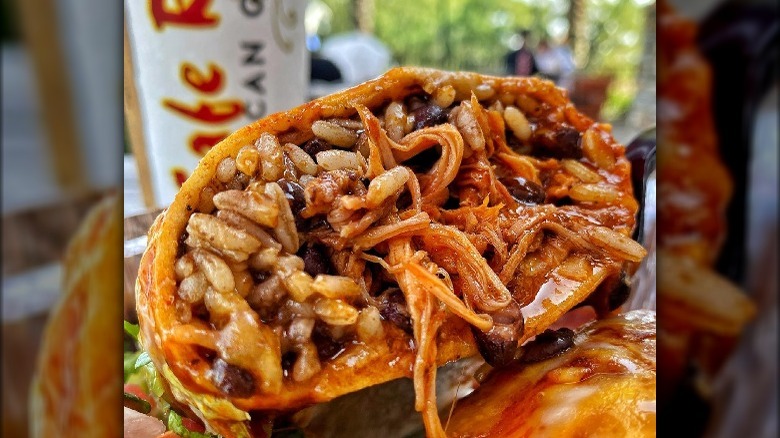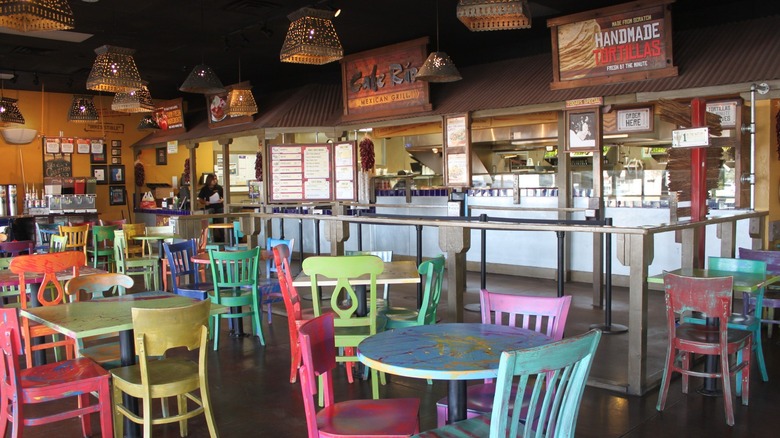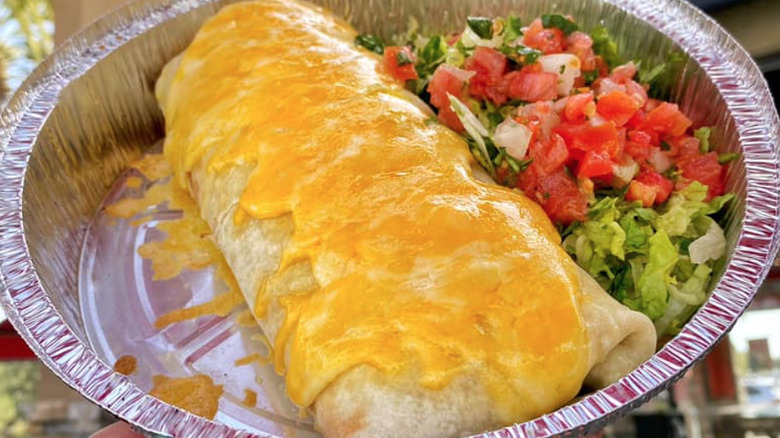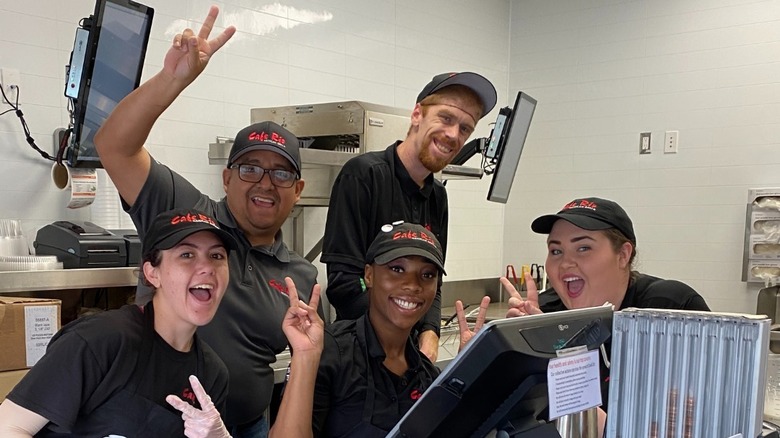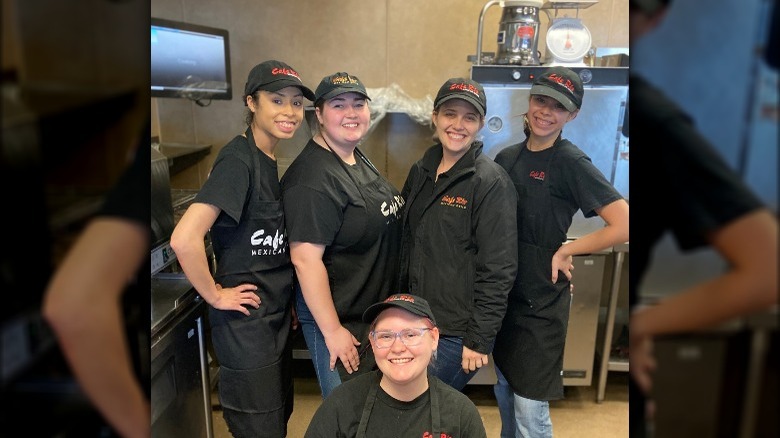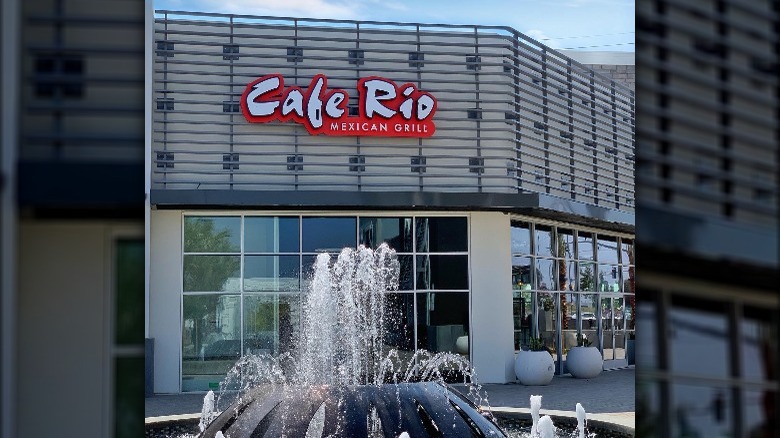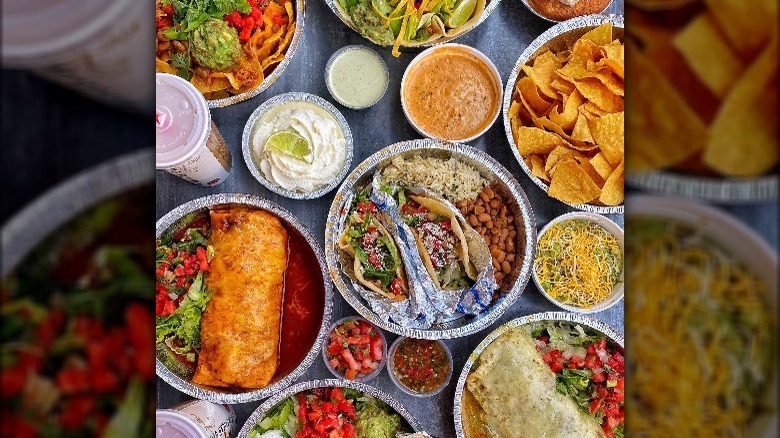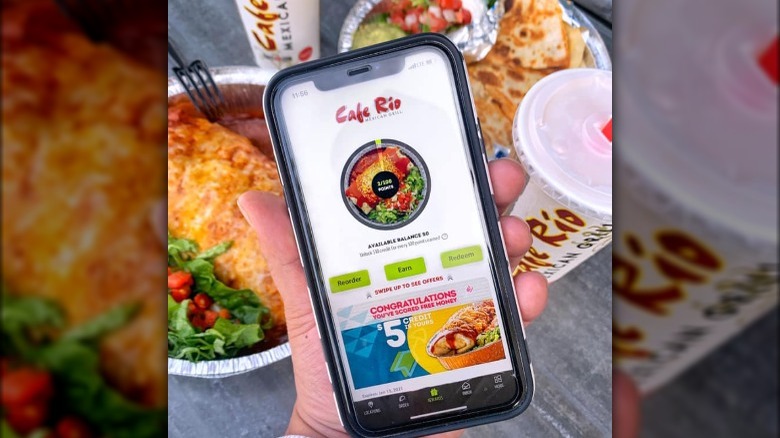Cafe Rio: 13 Facts About The Mexican Grill
In the world of Mexican fast-food chains, you may have never heard of Cafe Rio if you live east of the Mississippi River. But for those living in the western region of the United States, you are likely well-familiar with the home of the popular sweet pork barbacoa. Cafe Rio not only sells Mexican-inspired salads, burritos, and tacos, but it also has a fiercely loyal following, making it one of the top-performing regional fast-food chains.
What is it about Cafe Rio that makes it such a stand-out amongst Mexican-style fast-food restaurants? Perhaps it is the commitment to fresh ingredients, with no microwaves or freezers to be found in its restaurants. Or maybe it is the unique, family-esque work environment that keeps its employees happy. Whatever Cafe Rio's secret sauce is, it is a recipe as well-guarded as any other list of ingredients fans have attempted to recreate since it first opened in the late 1990s. Let's take a closer look at Cafe Rio and some facts about it that you may not know and see if we can uncover why its competitors may not want to discount this small-but-mighty chain.
The Utah-based restaurant was originally family owned
Like any great business venture, it all begins with a simple idea. Cafe Rio's origins are no exception. Like any other successful fast food chain, the story starts with its first location. According to its website, it was founded by couple Steve and Patricia Stanley, with the first location opening in St. George, Utah in 1997. From the start, Cafe Rio featured a menu filled with recipes inspired by dishes found in Northern Mexico, Southern Texas, and New Mexico.
In an interview with KUTV, founder Steve Stanley mentioned bringing the idea of a fast-food restaurant serving up freshly-prepared Mexican dishes to a couple of potential business partners, but they did not seem interested in the venture. But Steve Stanley's career as a chef had him poised to start a restaurant of his own. So, he decided to go into business with his wife Patricia, and the rest is history. Success happened quickly, with Stanley recalling the long lines of customers wanting to purchase one of Cafe Rio's tacos or salads. Originally, Stanley noted that he had no intention of selling the business, but others would soon catch on to the massive financial potential the restaurant had. It wouldn't be long before an offer came that the Stanleys could not refuse.
It went corporate in 2004
In the first seven years of operation, the chain had grown to a total of six locations around the state of Utah (via Restaurant Business Online). But as Steve Stanley hinted at in his interview with KUTV, he was eventually approached by investors interested in a stake in Cafe Rio. In 2004, Stanley sold the company to Bob Nilsen along with the private equity firm Saunders Karp & Megrue (via Nation's Restaurant News). The new owners quickly moved towards expanding Cafe Rio beyond Utah's borders, with its first out-of-state location opening in Gilbert, Arizona in 2006 (via Restaurant Business Online).
With growing success, it was reported that Cafe Rio once considered preparing for an initial public offering. According to Nation's Restaurant News, the company had begun interviewing banks in 2014 which sparked rumors of the IPO. Ultimately, however, the chain went against the idea of going public, and once again turned to a new private equity firm for ownership. 20 years after the first St. George location opened, the owners of Cafe Rio traded hands once again, this time to Freeman Spogli & Co in 2017 (via PR Newswire). The terms of the deal remain a mystery, though it was shared by Nation's Restaurant News that the management at the time kept "a meaningful equity stake" in the company.
It prides itself on fresh ingredients
So, what is it exactly that has all of these private equity firms wanting a slice of the Cafe Rio pie? After all, those long lines of customers Steve Stanley made mention of weren't showing up for just your garden variety taco. According to Cafe Rio, part of the secret to its success has been the way it prepares its food. The company prides itself on having no freezers or microwaves in its restaurants (sounds an awful lot like In-N-Out Burger), which means all of its ingredients are fresh and prepared by hand daily. According to its website, even the tortillas are made fresh each day on a hot comal.
According to Nation's Restaurant News, even the salsas and guacamole are prepared in-house on a daily basis. Simply put, there are very few items that are pre-made or pre-packaged inside a Cafe Rio. The freshly-prepared menu items don't just differentiate the brand from its competition in terms of taste. According to chief marketing officer Ben Craner, it makes a difference when customers can actually see the cooks making the food they are about to eat.
There is a big emphasis on employee training
Maintaining Cafe Rio's expectation of high-quality fresh food comes down to the employees that are in the kitchens day in and day out. To ensure it was recruiting top-tier talent, the company hired Andy Cooper to serve as Cafe Rio's Chief People Officer. In an interview with Fast Casual, Cooper shed some light on the hiring process and training program that the company believes has kept Cafe Rio one step ahead of its competition over the years.
In 2013, Cafe Rio launched a rigorous training program at the Salt Lake City headquarters called the Cafe Rio Advanced Food Training Institute, or C.R.A.F.T. for short. While training at the institute, both General Managers and sauce cooks learn about the history of the company, as well as the work that it takes to consistently deliver Cafe Rio's fresh products to the customers. Cooper even mentioned that the company takes inspiration from military training programs to instill both discipline and pride in the work the employees do on a day-to-day basis. Taking shortcuts is simply not a part of the company culture. Cooper says that the hard work is what draws so many candidates to want to work with Cafe Rio in the first place.
Customers love its sweet pork barbacoa
While the entire menu includes a variety of proteins, sauces, and other ingredients made from scratch each day, many Cafe Rio customers would agree that it is the sweet pork barbacoa that keeps them coming back week after week. The signature pork has been a Cafe Rio staple since the very beginning, as founder Steve Stanley referred to it as "Central American barbeque" during his interview with KUTV. Customers can order the pork on a variety of dishes, with its tortilla salad being amongst the top menu items according to Nation's Restaurant News.
Fans of the sweet pork barbacoa have been on a mission to figure out exactly what the recipe is, but to this day their attempts have been unsuccessful. Reddit threads have people swapping their copycat recipes, and Cafe Rio has taken notice. On their website, they make mention of how others have attempted to recreate their original barbacoa. They once got in on the buzz by pranking Facebook followers on April Fool's Day, promising to share the secret recipe.
Exact recipes are hard to come by, to fans' dismay
The sweet pork barbacoa is not the only recipe Cafe Rio fans have been seeking to recreate at home. There is commotion all over the internet for seeking the recipes of various menu items, including everything from its sauces to even its tortillas.
One Reddit thread sought to replicate the sweet tomatillo dressing, which had employees reaching out to old managers in search of the recipe. Another Reddit thread started off with a Cafe Rio fan bemoaning the fact that all copycat recipes they had come across were thus far nothing in comparison to the original. A third Reddit thread had someone looking for a recipe to recreate Cafe Rio's tortillas, to no avail.
If there was any confusion, Cafe Rio seems to be well aware of the many attempts made at recreating their ingredients. Founder Steve Stanley noted in his interview with KUTV that he would occasionally review copycat recipes online, but he had yet to find any that correctly guessed how to make their dishes (though he did admit a couple had gotten close).
It once sued a close rival
One company perhaps got a little too close to recreating the company's success, to the point where legal action took place. There are, of course, multiple Mexican fast food chains, like Chipotle, Taco Bell, and El Pollo Loco. But it was Costa Vida that caught the attention of Cafe Rio, which opened its first location in 2003 under the name Costa Azul. According to Fast Food Menu Prices, Costa Vida was another Utah-based Tex Mex fast food establishment that had more than a few similarities to Cafe Rio.
Cafe Rio ended up suing Costa Vida in 2005, claiming that the newer restaurant chain had copied not only the recipes, but the restaurant layout as well (via Explore Rexburg). The case was settled in 2007 and the exact details were never released to the public, but it left the two restaurants in an age-old rivalry that persists amongst their loyal fans to this day.
There is a not-so-secret menu item
One of the more fun aspects of being a repeat customer at your favorite restaurant chain is discovering new ways to "hack" yourself to the perfect meal, or secret menu items that make you feel like you are part of an "in-crowd" of the most loyal fans. But we have to ask: Is it really a "secret" menu item if it's posted all over social media?
That seems to be the case with Cafe Rio's "not-so-secret" menu hack known as the "queso-rito." The restaurant unveiled the hack on its Facebook page back in 2015, which involves ordering any of the burritos off of the menu and having it covered in their creamy queso sauce. Cafe Rio brought the hack up again on its Instagram page a few years later as one of the ways customers can enhance their burritos (along with ordering it Red Hot Hatch Chili Enchilada Style or Medium Hot Green Chili Enchilada Style). So next time you visit a Cafe Rio, order your queso-rito with confidence; there should be no question that it is on the "not-so-secret" menu.
Employees have positive things to say about their job experience
Even the dreamiest of dream jobs can still have its drawbacks, and Cafe Rio is not immune to criticisms for how the employee experience could be improved. However, when we checked out what employees had to say about their time working there, we found an overwhelmingly positive response. One employee shared on Indeed that working at Cafe Rio is not like what might be considered a typical fast food work experience, and that the sense of family they felt while working there changed their perspective on working in the industry entirely.
Another Indeed user echoed those sentiments, emphasizing the fun and positive environment they experienced at their location — not to mention the free food that they were able to enjoy as a perk. A third Indeed comment we found came from an employee who said they would recommend the job to others, highlighting the work culture and flexibility in their schedules as reasons they liked working at Cafe Rio. While others on Indeed pointed out that it is perhaps more fitting for a younger working demographic, or that it's really just a standard fast-food job, we found many positive remarks. Overall, there's a general sense that Cafe Rio is an enjoyable place to work.
Some of its staff get to go to Hawaii
How does an all-expenses paid trip to Hawaii for you and a guest of your choice sound? If you are a general manager at Cafe Rio, that could be more of a reality and less of a pipe dream than you might think. In his interview with Fast Casual, chief people officer Andy Cooper mentioned that the company's general managers, area and region Coaches, and other top-performing employees go to Hawaii every year. There are some work components tied into the trip, with Cooper mentioning in the interview that some of the time in Hawaii is spent sharing goals and initiatives with employees.
One general manager shared on Indeed that the annual trip to Hawaii was one of the highlights of their time with the company (to no surprise — it would likely be a highlight of ours, too!). Another Indeed user, an acting store manager at Cafe Rio, mentioned the free annual trip to Hawaii along with a plus one was one of the reasons they loved their job. One free trip to Hawaii sounds wonderful, but a free trip every year? Sign us up.
Cafe Rio is continuing to expand
Cafe Rio is still predominantly a western United States chain, with the vast majority of its restaurants located west of the Mississippi River. However, as of 2022, there are several locations in the Washington, D.C. metro area, including restaurants in Virginia and Maryland. Looking ahead, the company has plans for expansion. In March 2022, Fast Casual reported that Cafe Rio was intending on adding 15 locations to its roster by year's end. Some of the most recent locations to open are in the Denver, Colorado area, with two new restaurants welcoming customers as recently as the fall of 2022 (via 9 News).
Cafe Rio is not just expanding its reach nationwide, it is also revisiting cities where it already has a presence and offering new locations there as well. A new restaurant opened in its home city of Salt Lake City, Utah in September of 2022, according to the company's website.
Loyal customers are concerned about a possible decline in quality
One of Cafe Rio's defining qualities that it prides itself on is its loyal customer base. It is an asset to the company that was repeatedly brought up when it first went corporate, with investors highlighting the loyal customer base as a reason to go all in on Cafe Rio (via PR Newswire). Cafe Rio keeps its most devoted customers happy with perks like its rewards program. In its earliest years, Cafe Rio's loyal customers helped to bolster the company to various awards and recognitions, including being named the top Mexican restaurant in the nation several years in a row (via PR Newswire).
The more loyal the customers, however, the higher the pressure to keep those customers satisfied. They will likely be the first ones to tell you when there's a potential decline in quality, which is exactly what has been happening in recent years. One Reddit thread included multiple customers pointing out the decline in quality they have personally noticed. They specifically called out qualms with smaller portion sizes, lackluster customer service, and a shift in the restaurant's theming away from what once made it unique and special. Another Reddit thread went as far as to say that its food had reached "gross" level status. The user shared that they felt the company was now cutting corners, a move that Cafe Rio once said was a business practice they would not succumb to (via Fast Casual).
Cafe Rio is now opening digital cafes
The future of Cafe Rio goes beyond the promised expansion of its physical locations, as reported by Fast Casual. It is also turning to technology to reshape the customer experience. According to QSR Magazine, Cafe Rio is expanding its "Digital Cafe" locations. These restaurants have an added technological edge to them, leaning more heavily on mobile orders, kiosk ordering, and grab-and-go options. Cafe Rio says that the benefits provided by going digital are twofold: Customers can take advantage of more convenient ordering options, and the restaurant can seek to expand its physical footprint by now being able to move into locations with smaller square footage.
The move seems to be working well. QSR Magazine reports that Cafe Rio's customer participation in its digital cafes is among the highest for restaurants that offer similar programs, with a participation rating of over 35% as of May 2022. Cafe Rio CEO Steve Vaughan mentioned that a third of the company's sales revenue comes from either the mobile app or the website, so the success of the digital cafes may be no surprise. With the use of digital ordering tripling in just two years, Cafe Rio shows no signs of slowing down when it comes to its tech-driven offerings.
